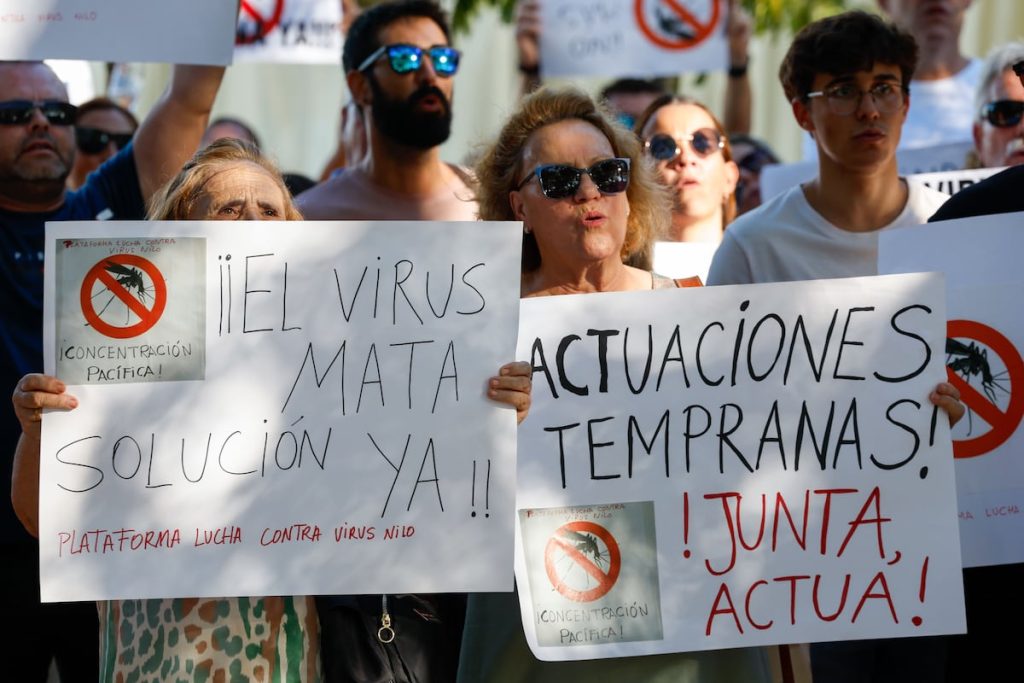The Nile virus that has caused five deaths in the province of Seville and around fifty infections in Andalusia is not new to Spain. It was first detected in Cadiz in 2010 and in 2020 it resulted in 76 cases and eight deaths. Residents in the riverside towns of the lower Guadalquivir are understandably concerned, but scientists do not see a reason for alarm. The virus typically causes a mild or asymptomatic illness, except in older people or those with compromised immune systems due to another chronic condition. Since mosquitoes are the vector, these populations should protect themselves with mosquito nets, repellent lotions, clothing that covers their skin, and avoid going outside at dawn and dusk, the peak hours for these insects. At this point in the summer, there is not much more that can be done, but preventive measures should have been taken earlier.
The key strategy to prevent Nile virus infection is to fumigate mosquito larvae in the spring. The toxin from the Bacillus thuringiensis (Bt) bacteria is highly effective in killing the larvae. Destroying adult mosquitoes, however, is extremely difficult, if not impossible in open fields. The Bt toxin, which is harmless to humans, is used in other areas of Spain that are also rich in wetlands, such as the Ebro Delta, where no infections or deaths are reported. It is a highly effective technique that, due to incompetence in administration, has not been applied in the lower Guadalquivir with the necessary intensity and anticipation. Rice fields and wetlands are optimal environments for this infectious agent. Migratory birds are the ones spreading the Nile virus, flying around the world and settling in these flooded lands. However, it is the Culex mosquitoes that bite the birds, become infected with the virus, and then transmit it to humans when they are bitten. Humans are accidental victims, as the human physiology is hostile to the virus, preventing it from reproducing freely. Despite this, it can still cause a mild illness, and in rare cases, be deadly for vulnerable individuals.
Since warm temperatures may continue for a few more weeks, it is useful to fumigate the area with Bt even at this time. The most important thing is to permanently correct this deficiency next year. This involves the municipalities, the Andalusian government, and the central government, who must come to an agreement on such an obvious and easy issue to resolve. Political climate is not an excuse for inaction in health matters. A broader reflection is needed. If there is not even the ability to solve such an easy problem – simply fumigating with a well-known product at the right time of year – what will happen if a truly dangerous epidemic occurs? Public health managers do not seem to have fully learned the main lesson from the Covid pandemic: prevention is much easier than cure.
In conclusion, it is essential to take proactive measures to prevent the spread of the Nile virus in the future. Fumigating mosquito larvae in the spring with the Bt toxin is highly effective and should be carried out with the necessary intensity and anticipation to avoid infections and deaths. Cooperation between local, regional, and national authorities is crucial to ensure that preventive measures are implemented effectively. Learning from past experiences, such as the Covid pandemic, highlights the importance of prioritizing prevention in public health management. By addressing the root causes of infectious diseases and taking action early, we can better protect vulnerable populations and prevent unnecessary suffering and loss of life. It is imperative that governments and health authorities prioritize public health and collaborate to safeguard the well-being of their citizens.















